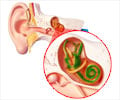What are the Risks and Complications of Labyrinthectomy?
Complications are rare when the surgery is performed by an expert surgeon. However, certain risks and complications of surgery may occur, which include the following:
- Infection: Infections can occur at the incision site and may be characterized by swelling, redness, tenderness, warmth, and pus formation
- Imbalance: There may be difficulty in maintaining balance for 4-6 weeks, till the opposite ear is able to compensate. This is usually temporary in young and active patients, but can be a major problem for elderly and sedentary patients
- Hearing Loss: Total loss of hearing will occur in the operated ear
- Headache: Moderate-to-severe headache may be experienced.
- Numbness: The operated ear may become numb, which can last for several months
- Vomiting & Nausea: These are common complications following surgery
- Facial Nerve Injury: This is extremely rare, but when it occurs, it can cause severe problems in the areas of the face that are innervated by the facial nerve
- CSF Leak: Leaking of the cerebrospinal fluid (CSF) may occur during surgery, which needs to be immediately repaired, as otherwise, it can cause serious complications like meningitis
- Altered Taste: There may be changes in taste sensation, usually presenting as ‘metallic taste’, which may last for several months











